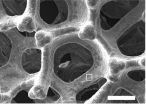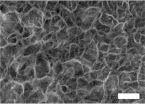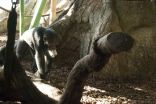INFORMATION:
Media contacts:
Associate Professor Chuan Zhao: + 61(2) 9385 4645, chuan.zhao@unsw.edu.au
UNSW Science media officer: Deborah Smith + 61(2) 9385 7307, + 61 (0) 478 492 060, deborah.smith@unsw.edu.au
Clean energy future: New cheap and efficient electrode for splitting water
2015-03-17
(Press-News.org) UNSW Australia scientists have developed a highly efficient oxygen-producing electrode for splitting water that has the potential to be scaled up for industrial production of the clean energy fuel, hydrogen. The new technology is based on an inexpensive, specially coated foam material that lets the bubbles of oxygen escape quickly.
"Our electrode is the most efficient oxygen-producing electrode in alkaline electrolytes reported to date, to the best of our knowledge," says Associate Professor Chuan Zhao, of the UNSW School of Chemistry.
"It is inexpensive, sturdy and simple to make, and can potentially be scaled up for industrial application of water splitting."
The research, by Associate Professor Zhao and Dr Xunyu Lu, is published in the journal Nature Communications.
Inefficient and costly oxygen-producing electrodes are one of the major barriers to the widespread commercial production of hydrogen by electrolysis, where the water is split into hydrogen and oxygen using an electrical current.
Unlike other water electrolysers that use precious metals as catalysts, the new UNSW electrode is made entirely from two non-precious and abundant metals - nickel and iron.
Commercially available nickel foam, which has holes in it about 200 micrometres across, or twice the diameter of a human hair, is electroplated with a highly active nickel-iron catalyst, which reduces the amount of costly electricity needed for the water-splitting to occur.
This ultra-thin layer of a nickel-iron composite also has tiny pores in it, about 50 nanometres across.
"The three-dimensional architecture of the electrode means it has an enormous surface area on which the oxygen evolution reaction can occur," says Associate Professor Zhao.
"The larger bubbles of oxygen can escape easily through the big holes in the foam. As well, the smaller holes make the electrode surface 'wetter', so the bubbles do not stick to it, which is a common problem that makes electrodes less efficient."
Hydrogen production is a rapidly growing industry, but the majority of hydrogen is still produced using fossils fuels such as natural gas, oil and coal, because this approach is still cheaper than electrolysis of water.
Hydrogen is a great fuel for powering mobile devices or vehicles, and storing electricity generated from renewable energy, such as solar.
"I think this electrode has great potential for the industrial-scale production of hydrogen. Our next goal is to understand the science behind it and to further improve its performance. Cleaner sources of fuel like hydrogen will be particularly important for reducing carbon dioxide emissions and solving the air pollution problems from the burning of fossil fuels such as coal," says Associate Professor Zhao.
ELSE PRESS RELEASES FROM THIS DATE:
Old blood as good as fresh in patients with life-threatening illnesses
2015-03-17
Tuesday, March 17, 2015. Just like milk and many other foods, blood used for transfusions is perishable. But contrary to popular belief, new research shows that blood stored for three weeks is just as good as fresh blood - findings published today in the New England Journal of Medicine.
The large clinical trial provides reassuring evidence about the safety of blood routinely transfused to critically ill patients. Supported by the Canadian Critical Care Trials Group and countless nurses, blood bank technologists, transfusion medicine and critical care physicians, Drs. ...
Workplace suicide on the rise: Specific occupations pose higher risks than others
2015-03-17
Ann Arbor, MI, March 17, 2015 -- Suicide is responsible for more than 36,000 deaths in the United States and nearly 1 million deaths worldwide annually. In 2009, suicides surpassed motor vehicle crashes as the leading cause of death by injury in the U.S. A new study published in the American Journal of Preventive Medicine analyzes the upward trend of suicides that take place in the workplace and identifies specific occupations in which individuals are at higher risk. The highest workplace suicide rate is in protective services occupations (5.3 per 1 million), more than ...
Chimpanzees will travel for preferred foods, innovate solutions
2015-03-17
(Chicago) - Just as humans will travel to their favorite restaurant, chimpanzees will travel a farther distance for preferred food sources in non-wild habitats, according to a new study from scientists at Chicago's Lincoln Park Zoo that publishes on March 17 in the journal PeerJ.
Chimpanzees at Lincoln Park Zoo prefer grapes over carrots. Previous research at the zoo provided that insight into food preferences. Now, a 15-month study, led by Lydia Hopper, PhD of the Lester Fisher Center for the Study and Conservation of Apes at Lincoln Park Zoo, suggests that the apes ...
Medications used to treat diabetes may trigger heart failure, study finds
2015-03-17
Toronto, ON (March 17, 2015) - A comprehensive study examining clinical trials of more than 95,000 patients has found that glucose or sugar-lowering medications prescribed to patients with diabetes may pose an increased risk for the development of heart failure in these patients.
"Patients randomized to new or more intensive blood sugar-lowering drugs or strategies to manage diabetes showed an overall 14 per cent increased risk for heart failure," says Dr. Jacob Udell, the study's principal investigator, and cardiologist at the Peter Munk Cardiac Centre, University Health ...
Seeps are microbial hotspots, homes to cosmopolitan microorganisms
2015-03-16
A new study, "Global Dispersion and Local Diversification of the Methane Seep Microbiome," provides evidence methane seeps are habitats that harbor distinct microbial communities unique from other seafloor ecosystems. The article appeared in the March 16 issue of the Proceedings of the National Academy of Sciences (PNAS).
Methane seeps are natural gas leaks in the sea floor that emit methane into the water. Microorganisms that live on or near these seeps can use the methane as a food source, preventing the gas from collecting in the surrounding hydrosphere or migrating ...
Laughter is an effective catalyst for new relationships
2015-03-16
If you want someone to open up to you, just make them laugh. Sharing a few good giggles and chuckles makes people more willing to tell others something personal about themselves, without even necessarily being aware that they are doing so. These are among the findings of a study led by Alan Gray of University College London in the UK, published in Springer's journal Human Nature.
The act of verbally opening up to someone is a crucial building block that helps to form new relationships and intensify social bonds. Such self-disclosure can be of a highly sensitive nature ...
Investigators find window of vulnerability for STIs to infect female reproductive tract
2015-03-16
Charles R. Wira, PhD, and colleagues at Dartmouth's Geisel School of Medicine have presented a comprehensive review of the role of sex hormones in the geography of the female reproductive tract and evidence supporting a "window of vulnerability" to HIV and other sexually transmitted infections (STIs). Published in Nature Reviews in Immunology, Wira's team presents a body of work that National Institutes of Health evaluators called, "a sea change" for research in the female reproductive tract (FRT).
"The FRT is tremendously complex and the normal changes that occur to ...
American College of Cardiology's 64th Annual Scientific Session tip sheet for March 16, 2015
2015-03-16
The studies below will be presented at the American College of Cardiology's 64th Annual Scientific Session on Monday, March 16.
1. New Insights on Endurance Sports and Atrial Fibrillation
Previous studies have suggested endurance athletes may face a slightly higher risk of developing atrial fibrillation, a condition in which the heartbeat becomes irregular or rapid. A new study shows that among runners, the total number of years a person has been running is the factor most closely associated with atrial fibrillation risk, as compared to other measures of running behavior ...
Scientists find DNA is packaged like a yoyo
2015-03-16
To pack two meters of DNA into a microscopic cell, the string of genetic information must be wound extremely carefully into chromosomes. Surprisingly the DNA's sequence causes it to be coiled and uncoiled much like a yoyo, scientists reported in Cell.
"We discovered this interesting physics of DNA that its sequence determines the flexibility and thus the stability of the DNA package inside the cell," said Gutgsell Professor of Physics Taekjip Ha, who is a member of the Carl R. Woese Institute for Genomic Biology at the University of Illinois. "This is actually very elementary ...
Mayo Clinic finds direct evidence of gadolinium deposition in brain tissues
2015-03-16
Mayo Clinic research finds direct evidence of gadolinium deposition in neuronal tissues following intravenous administration of gadolinium-based contrast agents used in MRI exams. The findings were recently published online in the journal Radiology.
In this study, Mayo Clinic identified patients who donated their body to medical research and had undergone multiple gadolinium contrast-enhanced MRI exams during their lifetime. Brain tissue samples from these patients were then compared to donors who had never received a gadolinium contrast agent. The patients exposed to ...



